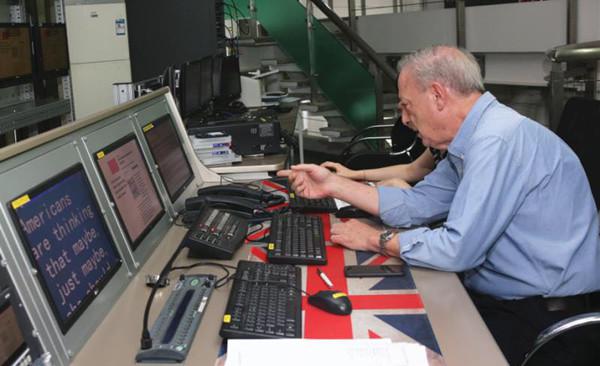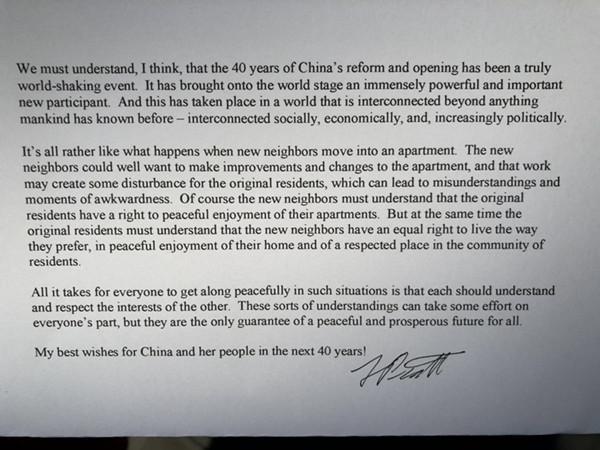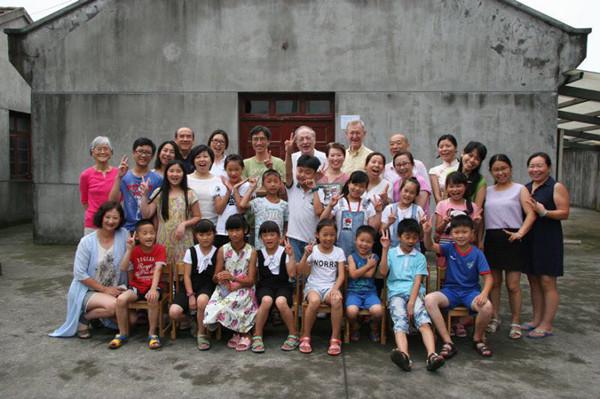Amazed at China's opening to the outside world, he decided to record this extraordinary change in video when he came to China more than 30 years ago. Today, recalling the past, his eyes glistened with tears.
He is Leonard Pratt, a senior expert with The International Channel Shanghai (ICS). This veteran journalist is very humble and polite. When being invited to accept this interview to talk about China's Reform and Opening up, he modestly stated that he was "not an expert".
Record China’s dramatic changes in video
He began by saying that he first came to China in 1981, when he lived in Hong Kong. At that time he often came to three mainland cities-- Beijing, Shanghai and Guangzhou.
When asked about the contrast between the society at that time and the present one, he smiled and described it as "two completely different societies". "At that time, everyone was well- dressed but certainly not richly or finely. The food in street restaurants was standardized and very basic, there was no great variety and it was very different from now," he frankly said.

Leonard Pratt at work
Since China’s land was undergoing a vigorous process of transformation, Leonard, who was sensitive to this change, decided to record all of this in real time with video. In 1987, Leonard, the then executive director of the Asian Broadcasting Corporation of America’s National Broadcasting Corporation (NBC), successfully convinced NBC's management to personally lead a special program team from US headquarters to mainland China. Co-produced with CCTV and Shanghai TV, they made a 12.5-hour live show "Changing China". This was the first time the global mainstream media had visited China. In the form of documentary and field interview, it reflected China, which had just begun the process of reform and opening up.
He talks about the original conception for the program,“China’s opening just starts and it is a very mysterious event for the entire world. So I wanted to introduce people to this extraordinary change, and introduce them to the history of China, the changes it is experiencing and the future things that are to happen.”

Comments and wishes from Leonard for China to deepen its opening up
In-depth shooting allowed Leonard to know more about the life of the Chinese.“I remember one time I interviewed a man and we went to his home. There was a tree growing in the middle of his living room. His home had been built around the tree. That was pretty rough. Especially in inland cities, the living standard is much lower. But now even in cities like Chengdu, there are tall buildings and bright lights. I don’t think there is one country that has changed as much as China has changed.”
Concerned about Shanghai’s development
He recalled the scene of coming to Shanghai for the first time 37 years ago.“When I first came to Shanghai, we were down by the river. I remember looking across the Huangpu River to Pudong, there was nothing there but only two or three broken-down warehouses. A dock was collapsing and falling into the river. But now when you look across the river, you see this”, he turned back to look at the bustling scene of the Shanghai Bund displayed on the studio screen. “In forty years. It’s really quite remarkable.” I saw a little tear in his eyes, which reflects the strength of emotion Leonard has for China and the transformation it has gone through.
Speaking of life in Shanghai today, he smiled heartily. "Shanghai is very livable now. Although I am not rich, I can go around here and do something interesting."
Leonard has been enthusiastic about public welfare in Shanghai and is concerned about the education of migrant children. His concern for these children began as early as when he settled in Hong Kong. He objectively evaluated the living conditions of the migrant families and their children that were in the city." Shanghai has done a lot of practical and effective work in migrant children’s education, employment and living conditions. The Chinese government has been actively responding to the migrant issue, and the current medical care and education of urban migrants has been greatly improved, but it is still a challenge."

Leonard and the faculty of a migrant children’s school in Shanghai
Leonard, who is in charge of a financial program for ICS, has a good understanding of China’s economy. He said that the supervision of the financial industry and the security of telecommunications are issues facing every country in the world. "China's reform and opening up is deepening, mobile phones and mobile payments are at the forefront of the world. Like other countries, financial security is also a challenge."
The work for ICS has brought unlimited fun to Leonard. He once said that he liked the job very much and enjoyed working with a group of Chinese colleagues who are professionally excellent and love media work. He believes in integrating Chinese and Western cultures and letting foreign audiences understand a prosperous China more objectively and completely through his own efforts.
In fact, Leonard, who loves Chinese culture, has translated the Chinese classic Six Records of a Floating Life before. The translated book was published in 1983 by the famous British Penguin Publishing House and was selected as Chinese classical reading by many universities in the US and the Britain.
In his opinion,“compared with the life of the ancient Chinese in this book, it is interesting that although China has developed into the present stage where the material aspects have improved a lot, many aspects of human nature have not changed, such as the love of family and dedication to it."
